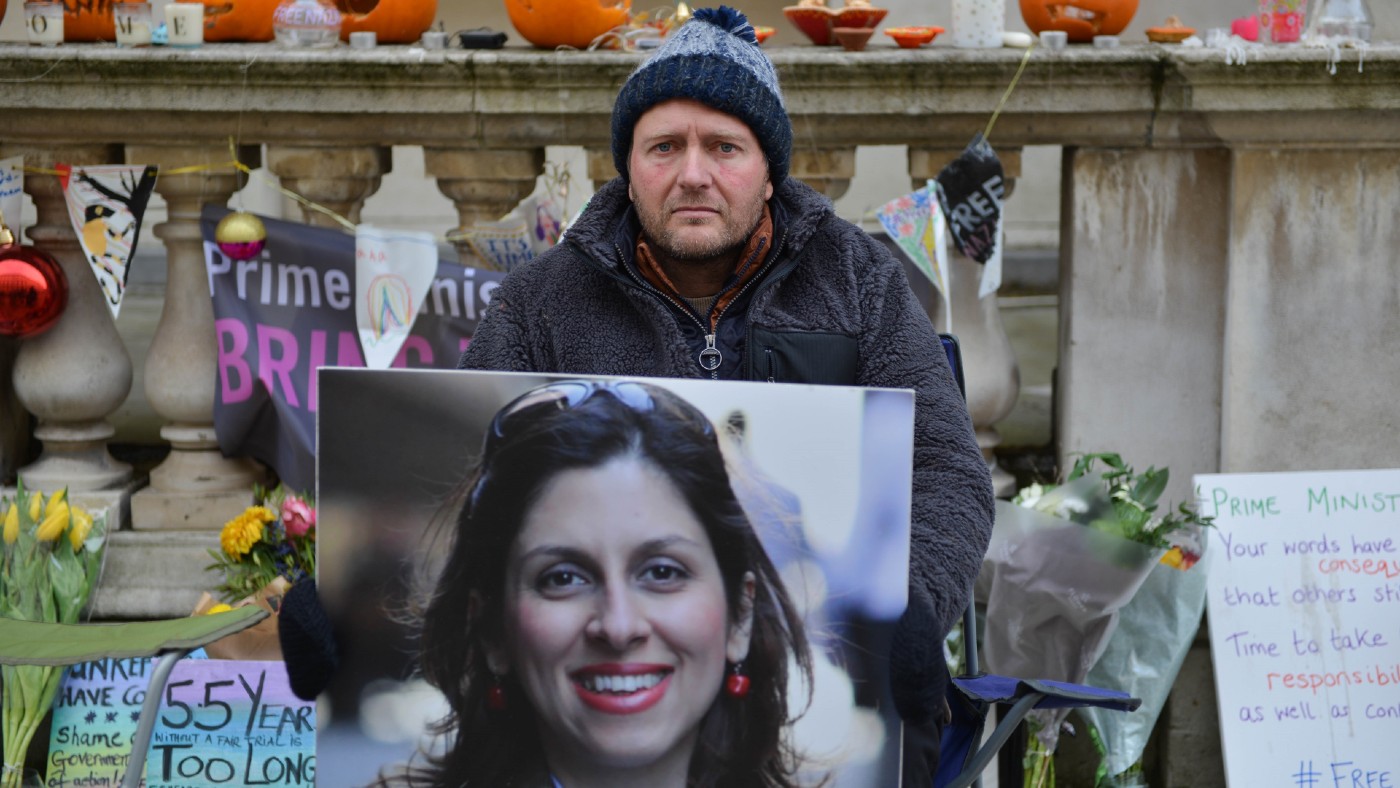The long battle to free Nazanin Zaghari-Ratcliffe
Charity worker detained in Tehran since 2016 on her way home to be reunited with six-year-old daughter and husband

A free daily email with the biggest news stories of the day – and the best features from TheWeek.com
You are now subscribed
Your newsletter sign-up was successful
British-Iranian charity worker Nazanin Zaghari-Ratcliffe is finally returning home to the UK after almost six years in detainment in Tehran, the government has confirmed.
Her local MP, Labour’s Tulip Siddiq, said she had been given her passport back and was “in the air flying away from 6 years of hell in Iran”. The mother of one had been under house arrest at her parents’ home in the capital, but is now free to return to her husband Richard Ratcliffe and their six-year-old daughter Gabriella in Hampstead, London.
Why was she detained?
Zaghari-Ratcliffe was arrested during a visit to Iran in April 2016 for allegedly seeking a “soft overthrow” of the Islamic republic. Iran’s Revolutionary Guards claimed that she was leading a “foreign-linked hostile network”.
The Week
Escape your echo chamber. Get the facts behind the news, plus analysis from multiple perspectives.

Sign up for The Week's Free Newsletters
From our morning news briefing to a weekly Good News Newsletter, get the best of The Week delivered directly to your inbox.
From our morning news briefing to a weekly Good News Newsletter, get the best of The Week delivered directly to your inbox.
Zaghari-Ratcliffe has always denied the claim, insisting that she went to Tehran on holiday so that her parents could meet her daughter, then aged 22 months old.
But in November 2017, then foreign secretary Boris Johnson made a “blunder” that set her case back, “by giving credence to Iran’s false claims about her”, said The Guardian. The now prime minister erroneously claimed that Zaghari-Ratcliffe was “simply teaching people journalism” during her visit.
Her employer, the Thomson Reuters Foundation, released a statement confirming that Zaghari-Ratcliffe had been on holiday, and the Foreign Office later insisted that Johnson’s remarks provided “no justifiable basis” for further legal action against her.
But despite long-running negotiations, she has spent most of the past six years in Iran’s infamous Evin jail, where prisoners are subject to “torture and other cruel, inhumane, and degrading treatment”, Amnesty International reported last year.
A free daily email with the biggest news stories of the day – and the best features from TheWeek.com
Zaghari-Ratcliffe was removed from Evin in 2020 because of the Covid-19 pandemic and has been under house arrest at her parents’ home since then.
In April 2021, Zaghari-Ratcliffe was sentenced to another year’s confinement and a one-year travel ban after being found guilty of “spreading propaganda” against the Iranian government.
Her lawyer said she had been accused of “participating in a demonstration outside the Iranian embassy in London 12 years ago and giving an interview to the BBC Persian service”.
Why has she been released?
The detention of Zaghari-Ratcliffe and other British-Iranian dual nationals has been linked to a £400m debt dating back to 1971. Five decades ago, the UK agreed to sell 1,500 Chieftain tanks to Iran, but when the Middle Eastern nation’s shah “was toppled eight years later, we refused to deliver the tanks but kept the cash”, explained The Times’ Clare Foges.
“International courts have agreed that we owe them money” and “the UK government has acknowledged the debt”, Foges continued. And “it has become clear that for the Iranians, the release of the money is a precondition to the release of Zaghari-Ratcliffe”.
Her husband maintained that his wife was being used as a bargaining chip for Iran over the unpaid debt and “as leverage in talks over the nuclear deal between Iran and world powers”, the BBC reported.
Last March, the then recently retired head of the Foreign Office, Simon McDonald, told BBC Radio 4’s Today programme that the UK had been looking at clearing the historic debt to Iran through humanitarian payments.
“We acknowledge it is Iranian money and it does have to go back to Iran,” he said, adding that “a key complication is that Iran is subject to very comprehensive sanctions so how this money is repaid is part of the story”.
The return of Zaghari-Ratcliffe’s passport yesterday was “the firmest signs for months that the 43-year-old’s ordeal could be over imminently”, said The Telegraph.
The UK government has since confirmed that it has settled the 1970s debt, although had previously said the two issues should not be linked.
Johnson said he was “delighted” that Zaghari-Ratcliffe and Anoosheh Ashoori, another Iranian-British national who has been freed, “will be reunited with their families”.
Kate Samuelson is The Week's former newsletter editor. She was also a regular guest on award-winning podcast The Week Unwrapped. Kate's career as a journalist began on the MailOnline graduate training scheme, which involved stints as a reporter at the South West News Service's office in Cambridge and the Liverpool Echo. She moved from MailOnline to Time magazine's satellite office in London, where she covered current affairs and culture for both the print mag and website. Before joining The Week, Kate worked at ActionAid UK, where she led the planning and delivery of all content gathering trips, from Bangladesh to Brazil. She is passionate about women's rights and using her skills as a journalist to highlight underrepresented communities. Alongside her staff roles, Kate has written for various magazines and newspapers including Stylist, Metro.co.uk, The Guardian and the i news site. She is also the founder and editor of Cheapskate London, an award-winning weekly newsletter that curates the best free events with the aim of making the capital more accessible.